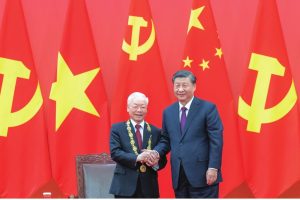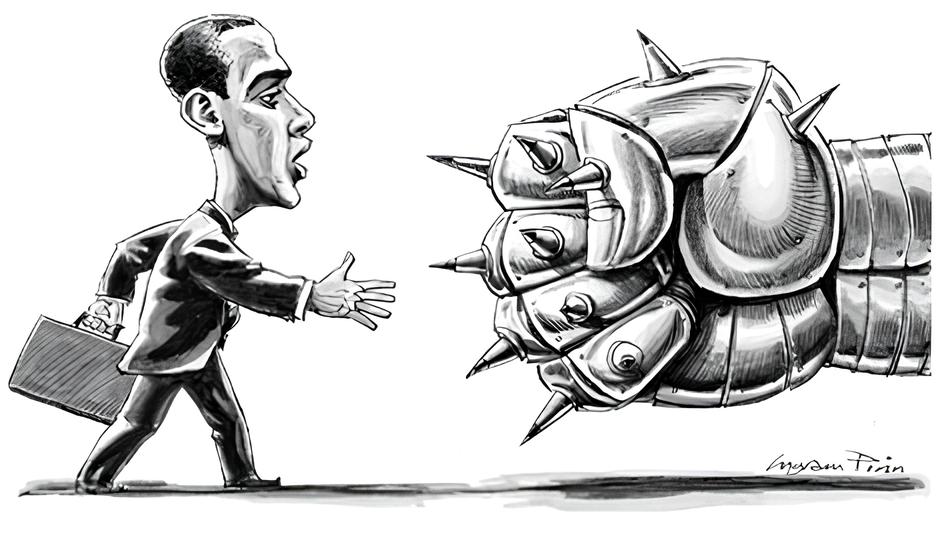
The concept of soft power is a common method frequently used by states to manage the masses.
November 20, 2023

PERSPECTIVE OF SOFT POWER
In the field of international relations, power is usually considered in relation to military and economic might and is defined and assessed in easily measurable, “hard” terms. The use of force, the threat of force, financial incentives and economic penalties are examples of hard power components. Unlike the coercive nature of hard power, soft power focuses on the use of positive attraction and persuasion to achieve foreign policy objectives. “Soft power” refers to a world order that emerges through the creation of centers of attraction, diversified networks, and international norms without the use of traditional foreign policy instruments.
In the late 1980s, a new idea entered the foreign policy literature thanks to the work of American political scientist and Clinton-era authority Joseph Nye. In defining the post-Cold War era, Nye called this idea “soft power”. “Power that can be used to do what needs to be done and control others” and “power necessary to make others do what they cannot do” are two definitions Nye added to the idea of power beyond the use of force. Nye argues that counting the number of missiles, tanks and troops makes calculating the elements of hard power a simple and measurable procedure. In contrast, the soft power components pose a difficult problem. Nye divides his analysis of soft power components into three categories: institutional, ideological, and cultural. Nye says that soft power components are seen to have the capacity to help a country to influence the global environment. Thus, “If a state can legitimize its power in the eyes of others, it will face less resistance to its wishes.” and “If a country’s culture and ideology are attractive, the other side will be more willing to do what others want.”
EXAMPLES OF THE USE OF SOFT POWER
Anthony Lake, national security adviser to Bill Clinton, the first US president elected after the Cold War, stated that “promoting democracy and liberal values abroad” was essential for the country’s future success. To change the systems of the rest of the world, the United States and its European partner have embarked on a “growth path based on soft power elements” while increasing their influence. The world’s governments and societies have found the cultural-ideological claims of US soft power less and less credible in light of George W. Bush’s assertions during the Iraq War that “the United States is a moral country” and that “moral truth is the same in every culture, at all times and in all places”.
In today’s world, soft power is being replaced by hard power. For example, by de facto annexing Crimea from Ukraine, Russia has gained the largest significant territorial advantage since the end of WW2. Moreover, Moscow’s strong measures and military presence in Syria have influenced the course of the civil war in the country in its favor. Nye emphasizes that military and hard power can directly contribute significantly to the development of soft power in this particular environment. In fact, the lure of military power can serve important purposes in times of conflict, such as winning soldiers to its cause and promoting favorable perceptions among the population in the strategically targeted region.
MORE DIFFICULT?
Any state can subjugate people using its physical power, but if it also uses soft power to influence corporations, foundations, universities, religious institutions, and other non-governmental organizations, it can spread its influence and turn long-held beliefs in its favor. In Nye’s argument, US culture, values and principles are crucial for the US to win allies and supporters. Nye claims that although soft power can widely influence the outside world, it is difficult to use to achieve goals.
There are various reasons why some argue that hard power (or military power) is not as important or widely used as it once was, but some, such as Joseph Nye (1990), argue that despite the presence of military power throughout history, ” For modern superpowers, using direct force for economic advantage is frequently too costly and risky. “. Even in the absence of aggression we can say economic resources into military power can be extremely expensive. Many consider economic and military power to be “simple”. However, Nye (2004) argues that soft power poses greater challenges because a significant proportion of its key resources are not under government control and its results depend crucially on the acceptance of the audiences it targets. Moreover, the development of adequate soft power capabilities can take a long time for a country, making soft power even more difficult to achieve (Nye, 2004).
Moreover, as nations become more economically interdependent, the possibility and option of using force to resolve conflicts diminishes. Soft power proponents have claimed that governments must modify their conception of power as a result of the decline of hard power in international relations and the increased efficacy of soft power. Some have even suggested abolishing the military to fund these other soft power issues. However, the initial good results of soft power for the United States created an illusion: that soft power could permanently and irrevocably stand on its own and not lose its impact as it did at first. As Nye points out, soft power is in fact and always has been a continuation of physical power.
WHY DO STATES USE SOFT POWER?
Instead of spending money on the military, a state may need to build soft power, such as media (communication), organizations and institutional issues, among other forms of power, to maintain its influence in the international arena. Even regimes seeking to preserve their security can attest to this. While many view military and economic power as “simple”, soft power is a bit tough to achieve because it can take a while for a nation to develop these capabilities sufficiently and many of its vital resources are not under the control of the government. Furthermore, the acceptability of audiences also has a great influence on how soft power works. Soft power can also stem from domestic and foreign policies, but if these policies are arrogant or hypocritical, they can sometimes undermine soft power. For example, US human rights programs were met with resistance in Argentina in the 1970s because of the military junta. However, after the Peronists came to power in the 1990s, the US was able to increase its soft power and gain UN support for its policies. However, the appeal of the US declined in the 2000s after the Iraq War, as many people opposed the war. Public diplomacy and nation building are seen as additional soft power tools. “Communicating directly with foreign publics with the aim of influencing their thinking and ultimately that of their governments’ ‘ is the simplest way to describe it (Nisbet et al., 2004: 15). Moreover, public diplomacy gained importance thanks to the increase in communication technology and it made it easier than ever to communicate with audiences abroad.
WHAT ARE WE TRYING TO ACHIEVE?
In conclusion, nations wishing to strengthen their soft power should give importance to popular diplomacy. Media is one of the most important platforms for public diplomacy. According to Van Ham (2010: 91), “The media provides the infrastructure for these societies to stay together, while culture acts as the glue that holds them together. “States can use a range of soft power techniques in both international and domestic political relations, most of which revolve around public diplomacy with other countries and international organizations. However, it is important to remember that soft power only works when government programs benefit other people, because ” Unpopular products cannot be sold even with the finest advertising, and policies that are blatantly self-serving or haughtily portrayed are more likely to erode soft power than to build it”, and flawed policies cannot be corrected or camouflaged by soft power (Nye, 2004: 10).
Nye (2004) cited as an example of soft power the role of American missionaries and their work in regions where the overwhelming majority of the population is Muslim. Even if these actors are not authorized by the government or associated with government departments, they will always exist because, as Nye (2004) points out, some will always see them as a disgrace to the state or the community in question. A few recent examples are the controversies surrounding acts of Islamophobia by non-governmental actors in the US, such as Terry Jones’ Quran burning or the film “Innocence of Muslims”, which was criticized by US authorities for being both Islamophobic and aware that some Muslims might try to associate the film with the US government.
Moreover, governments also tried to use soft power during the First World War (Nye, 2004). Then, when radio technology developed, nations started to use this medium to promote different ideologies (Nye, 2004). Although it has a long history, it can be said that soft power has received more attention in international politics after the end of the Cold War. During this period, the main topics of discussion in foreign relations were military and financial aid. Such incentives were used by the US and the USSR to persuade their allies to support their political and economic systems. Moreover, despite the collapse of the Soviet Union and the financial and military losses incurred by both countries, the United States was considered to have emerged from the Cold War with more soft power than it had a few years earlier, rather than with a stronger military or economy (Nye, 1990).
A curated seletion of FA’s must-read stories.
Written By: BUGRA NARIN
Written By: FURKAN ETIK
Written By: ALPEREN MOROVA
Written By: OMER FARUK KARA
Written By: E. ERDEN
Written By: SHOHREH POOLAB
Written By: ALEYNA TASTAN
Written By: CIHAN KAAN GAZI

Dilara Şahin is a senior student of International Relations who writes articles about her primary field of interest. In addition to her focus on International Relations, she also writes about sociology.
Written By: ABDURRAHMAN ADIGUZEL
Written By: BEYZANUR SARICICEK
Written By: SELIN ARDIC
Written By: NILAY CELIK
Written By: ELDANIZ GUSSEINOV
Written By: JOSEF SCHOEFL
Written By: SINEM UNALDILAR
Written By: FATIH CEYLAN
FA’s flagship evening newsletter guilding you through the most important world streis ofthe day. Delivered weekdays.
